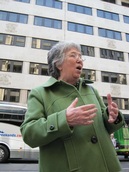Is older people's wealth being fairly utilised to pay for care?
01-Oct-12
Dot Gibson, National Pensioners Convention, general secretary

Stephen Burke, United for All Ages
To view the results of the poll, you need to vote!
YES “This idea that the country’s economy is struggling because an army of millionaire pensioners are joy riding with their free bus passes is absolute nonsense. The economic crisis is being used as an excuse to undermine the welfare state and roll back some of our hard earned gains – many of which are necessary because the UK has one of the worse state pensions in Europe. For just 75p a day, the average tax payer could help fund a much needed comprehensive, good quality care system that treats older people with dignity.
“The truth is that every year pensioners contribute £40bn to society in the form of taxes, voluntary work and unpaid caring. Removing the bus pass from everyone for example would raise just £1bn, but would lead to increased isolation and social exclusion amongst the elderly; ultimately costing more in the long run with higher demands on social services and the NHS.
“If society is truly outraged by the super-rich getting such benefits, it is perfectly possible to use the tax system on those 250,000 top rate tax paying pensioners to recoup extra funds without the need to resort to a means-test. Any political party that goes to the next election promising to take away the bus pass and the winter fuel allowance from 11m older voters will therefore not only get a shock at the ballot box, but also end up costing the country more in the long-run.
“A National Care Service would end all these problems. We would end the unfair means-test and postcode lottery of charges, we could stop people from having to sell their homes in order to pay for care, we could widen access to services to all in need and we could professionalise the care service with better training and conditions, but most importantly we would establish the principle that as a society we have a responsibility – just like with the NHS, education and the armed forces – of all paying in so that those who need help can draw out.”
NO: “The wealth held by many (but by no means all) older people should be the starting point to pay for care. It would also be intergenerationally fair compared to general taxation.
“As has been widely documented, the care system is severely underfunded and in crisis. More and more older people and their families are having to pay for their care and face losing their homes to do so. Families can’t wait any longer for the government to create a sustainable and fair way to fund better care.
“With immediate effect the government should raise the assets threshold for paying for care to £100k. Local authorities should ensure that older people and their families can access specialist, independent financial advice on paying for care and make sure that deferred payments schemes are in place throughout the country.
“In the longer term better care for our ageing population will cost us all more. Fairly taxing older people’s wealth would be a better way forward. Or the government could recognise the contributions towards care costs made by older people and their families through the tax system or assets threshold. Action is needed urgently to tackle the care crisis and address families’ fears.
“It shouldn't be about pitting old vs young. We should be looking at where wealth lies in our society - and there are some very wealthy older people as well as some big companies sitting on huge reserves.
“Wealth may be cascading down the generations, but it’s getting concentrated in the hands of fewer and fewer families. What we need now is a new debate about inheritance and how some of the wealth in our society can help get us all through this crisis.
“The Government could looking at a levy on inheritance tax, state duty, or tax revenues back to larger estates, rather than favouring the proposals of a care cap that doesn’t even cover the growing needs of an ageing population. The Dilnot Commission will only succeed in complicating the current system, which desperately needs to be simpler and sustainable.
“We could pay for better care by taxing older people’s wealth and income, rather than expecting younger working people to subsidise care through income tax.”
Latest Debate News
 21-Jun-21
Should the Covid vaccine be mandatory for care home workers?
21-Jun-21
Should the Covid vaccine be mandatory for care home workers?
 09-May-17
Should residents be allowed to smoke in care homes?
09-May-17
Should residents be allowed to smoke in care homes?
 15-Sep-15
Should care workers call residents 'sweetie' and 'love'?
15-Sep-15
Should care workers call residents 'sweetie' and 'love'?
 23-Jul-15
Do you think the Care Cap should be delayed?
23-Jul-15
Do you think the Care Cap should be delayed?
 01-Oct-14
Should care homes have CCTV?
01-Oct-14
Should care homes have CCTV?